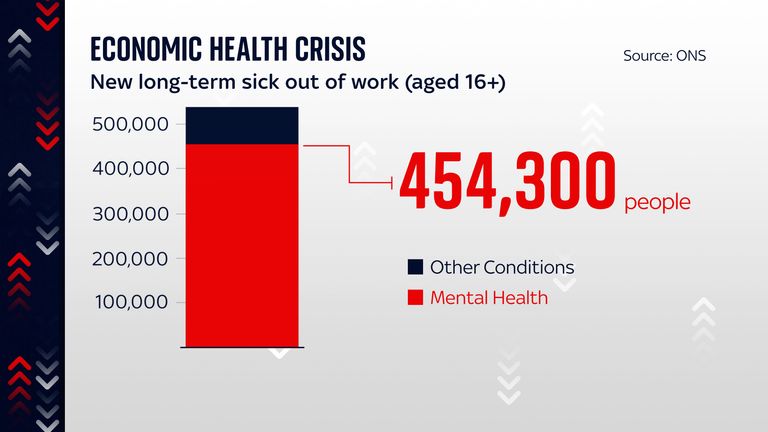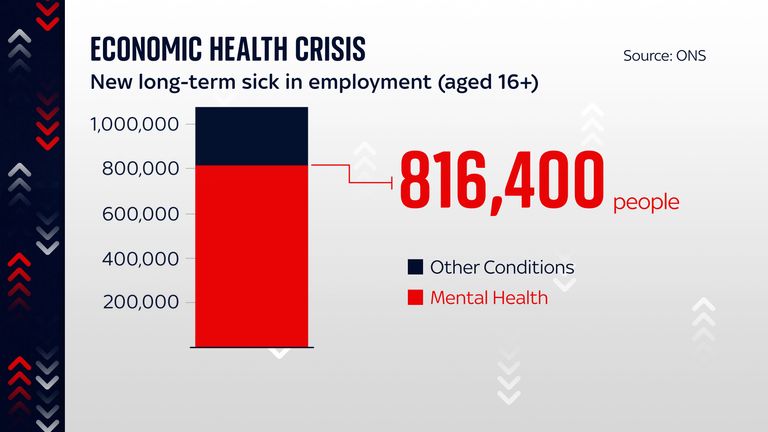
[ad_1]
Britain is within the grip of a psychological well being disaster that’s inflicting employees to drop out of the labour market and fuelling employees shortages.
The variety of individuals neither working nor in search of work has ballooned for the reason that pandemic to virtually 9 million.
Figures analysed by Sky News present that that is being pushed by long-term illness and, particularly, psychological well being circumstances.
Levels of financial inactivity among the many long-term sick jumped by 537,500 between the 12 months to June 2019 and the 12 months to June 2022.
Some 454,300 might be attributed to psychological well being circumstances, corresponding to melancholy, stress and anxiousness orders. The figures relate to these aged 16 and over.
Plummeting participation charges pose challenges for companies. Although the variety of job vacancies is falling after a post-lockdown jobs increase, they continue to be close to report ranges.
This means employers have fewer employees to select from when filling roles and limits the economic system’s potential to develop.
The figures additionally counsel that employers may higher assist the employees they do have. The variety of employed individuals with long-term psychological well being circumstances jumped by 816,400 over the identical interval.
A latest report by the skilled companies agency Deloitte discovered that the annual prices to UK employers of poor psychological well being have elevated by 25% for the reason that begin of the pandemic. This might be measured in ranges of absenteeism, productiveness and turnover.
Policymakers are alert to the issue.
Rise in financial inactivity will ‘maintain UK progress again’
Jonathan Haskel, a member of the Bank of England’s rate-setting committee, warned final month: “In most countries in the developed world, the economic inactivity rate, that is the proportion of people neither working nor actively searching for jobs… increased during the pandemic, but then fell back.
“But the UK is totally different….This rise in financial inactivity will maintain UK progress again.”
Growth will be key for the government as it seeks to fill a gaping hole in public finances. If more people are out of work it means smaller tax receipts for the Treasury and higher levels of spending on unemployment benefits.
Britain’s incapacity advantages invoice has already reached £14.7 billion. Four-fifths of the rise within the variety of incapacity advantages recipients over the previous 20 years has been pushed by psychiatric circumstances, corresponding to psychological well being issues and studying disabilities.
Uptick in incapacity advantages ‘pushed by psychological well being circumstances’
Tom Waters, an economist on the Institute of Fiscal Studies, stated: “If those trends continue, that’s going to continue to put pressure on that expense, particularly at a time when the government is struggling to fill the deficit.
“When we glance during the last couple of a long time, there’s been a extremely massive uptick in (the variety of individuals) on incapacity advantages. That’s been virtually solely pushed by psychological well being circumstances. So we’re taking a look at one thing on the order of about 1,000,000 individuals now claiming incapacity advantages for psychological well being. That makes up virtually half of everybody who will get incapacity advantages. If we glance again to the early 2000s, it was solely a couple of quarter or so.”
At 3.5%, Britain’s unemployment rate is at a record low, but it belies worrying long-term trends that have been made worse by the pandemic.
A mental health epidemic is driving an increase in economic inactivity among the long-term sick. These people are not looking for work so they do not show up in the unemployment figures but the longer they remain out of work, the harder it will be for them to return.
A smaller workforce means there are fewer people to produce the goods and services that help the economy to grow.
It also increases competition for workers, bidding up wages at a time when inflation is running rampant.
The Bank of England has already asked workers to show “restraint” when asking for pay rises however, with competitors rife, employers could haven’t any selection however to fork out for employees.
[adinserter block=”4″]
[ad_2]
Source link

